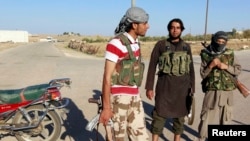While U.S.-led coalition forces continue to attack Islamic State group and other Islamist militants in Syria and Iraq, some analysts say one of the key elements of beating IS is avoiding making new enemies among the warring parties and handing the group more allies.
One of the trickiest things for coalition forces fighting the Islamic State is determining which groups should be enemies and which should be allies. And it is “allies,” analysts say, that are important, not “friends.”
Director of the Carnegie Middle East Center in Beirut, Lina Khatib, says from the beginning coalition forces made a mistake targeting al-Qaida affiliate al-Nusra along with the Islamic State.
Khatib says the group could be a short-term coalition ally because it is also a long-time enemy of Islamic State militants.
And while al-Nusra is technically also fighting the so-called ‘moderate’ rebel groups, they do have a relationship that Khatib calls “back-door” connections.
But for the West and in Lebanon, where al-Nusra forces continue to attack the borders, the idea of working with al-Nusra is impossible for the public to swallow, says the director of American Strategic Studies in Beirut Kamel Wazne:
“It has been identified as a terrorist organization, as part of the havoc that is taking place in the Middle East," he said. "We have to remember those people committed a lot of murder, a lot of destruction, a lot car bombings, a lot of suicide attacks. So do we really trust them?”
But as airstrikes continue and civilian casualty numbers mount, International Crisis Group acting program director for the Middle East and North Africa Robert Blecher says the coalition’s options for friends on the ground will quickly diminish.
During air campaigns in countries like Pakistan and Yemen, he says, new enemies were created every time a bomb hit a village or a wedding party.
“Can anybody name a sustained air campaign that has not generated considerable civilian casualties in a way that has not complicated the mission? I can not think of an example,” he said.
The complications he mentions could be considerable in Syria, which is already embroiled in a complex civil war. Besides anger over civilian deaths, coalition air strikes are essentially boosting the government of President Bashar Assad. And the main enemy of the rebel groups the coalition is counting on for ground support is the Assad regime.
“Your creating a situation where it is very difficult for mainstream rebels to not come out against the strikes," said Blecher. "And rebels end up getting pushed away from the mainstream groups towards the more radical groups because it looks like the U.S. is acting on behalf of the regime.”
Blecher says if they do not support the coalition the mainstream rebel groups most likely will not back extremists, but they will be on the same side.
Establishing strong allies is also made difficult by long-term animosity among locals towards the West in Syria and Iraq, he says. To justify allying with the United States and the West, Blecher says fighters ideologically opposed to Islamic State extremism will need concrete and sustained support.





